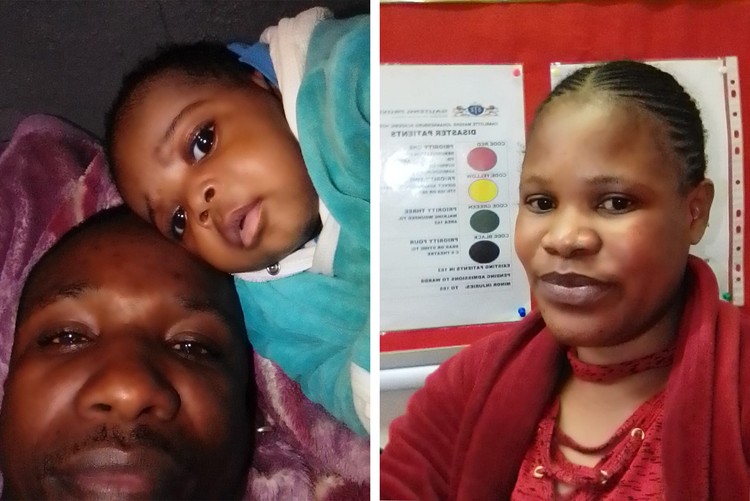
31 July 2024
Mike Ngulube, his daughter Memory and his wife Joyce Banda. Memory and Joyce died in the Marshalltown building fire on 31 August 2023. Photos supplied
Nearly a year after 76 people, including children, died in the tragic fire that broke out at a five-storey building in Marshalltown, Johannesburg, many families are still waiting to bury their loved ones.
Some families like the Ngulubes who lived in the Usindiso building say they have not been able to find closure following the tragedy.
Mike Ngulube, a Malawian national, told GroundUp that the body of his 21-month-old baby girl, Memory, is still missing.
Tearfully, Ngulube recounted the harrowing moments when he called out to his wife and baby in their smoke-filled room. His wife and daughter never made it out on the night of 31 August 2023.
Ngulube explained that he only found out later while he was in hospital being treated for severe burn wounds that both his wife and daughter had died.
He has since managed to identify his wife’s body which was buried in Malawi. But when he asked the state about his baby, Nsulube said he was told that his daughter’s body had mistakenly been given to another family whose baby also died in the blaze. To this day, he is yet to get answers from the state.
“I am devastated,” he said. “Despite taking DNA samples for forensics to go and recover my baby’s body, nothing seems to be happening. All I want is to give her [Memory] a proper burial,” said Ngulube.
With nowhere else to go while seeking answers about his daughter’s body, Nsulube said he had no choice but to move into another dark building in Joburg’s city centre.
Activists from the Marshalltown Fire Justice Campaign say survivors of the blaze are yet to see any real justice, and some families of the deceased are yet to find closure after being deprived of a chance to bury their loved ones.
A Commission of Inquiry was established in September 2023 to investigate the circumstances which led to the fire. In its report, released in May this year, the Commission found that the City is liable for neglecting the Usindiso building, among about 200 dark buildings in a similar state in the inner centre.
Following the release of the inquiry’s report members of the Marshalltown Fire Justice Campaign are demanding that the City take full responsibility for the tragedy.
They have also called for swift action on the Commission’s recommendations, urgent action to alleviate the city’s housing crisis, for survivors to be compensated, and for the Department of Forensics to release 19 bodies still being held at the Diepkloof Mortuary to their families.
Nigel Branken from the Marshalltown Fire Justice Campaign criticised the way in which the City had managed the response to the incident.
The survivors were not given proper accommodation or compensation. Some children whose documents went missing due to the fire are not going to school and some foreign nationals faced deportation under devastating circumstances, he said.
“Some of the victims were moved to the Denver settlement, and the conditions there are not suitable for habitation. People were promised that it would be temporary emergency accommodation, but now it seems the place is becoming their permanent home. The place is far away from shops, education, and job opportunities. We are pursuing the issue of compensation even though it was not recommended in the commissioner’s report,” said Branken.
Survivors of the fire who were relocated to the Denver settlement on the outskirts of the city centre say life has become a nightmare. Many of them had survived on hustling and getting odd jobs in the city centre, but without a means to get there, they have been struggling to survive.
While there are several toilets and communal water taps, the residents believe the housing is not dignified, and that their homes flood during the rainy season.
While people in Denver were fortunate to find accommodation, dozens of others were scattered across the city with no place to live.
Siphesihle Gababana shares a structure in the Denver settlement with his friend. He used to sell waffles to workers in the city, but since his machine burnt in the building he has not been able to make money.
He said life in Denver was not the same because the toilets are outside and there is no electricity. “For many of us, life will never be the same again. We have been left stranded far from our livelihoods in the city,” said Gabanana. “We deserve better, and the City should compensate us and give us better houses.”
The second phase of the Commission of Inquiry is expected to start soon.
The City of Johannesburg was sent questions. Their response will be added once received.